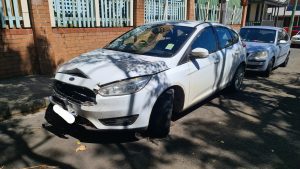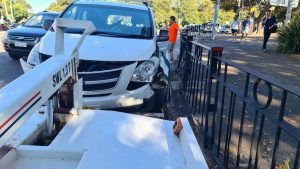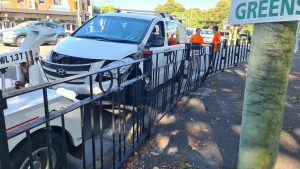Car accidents can happen to anyone, at any time, and can be a jarring and stressful experience. In the immediate aftermath of a car accident, it can be challenging to know what to do next. However, taking the right steps after a collision can help you protect yourself, your passengers, and your legal rights. Whether it’s a minor accident or a more serious crash, knowing what to do after a car accident is essential. By following these steps, you can ensure that you are taking the necessary actions to stay safe, protect your rights, and recover from any damages or injuries sustained in the accident.



1) Turn Your Hazard Lights On
One of the most important things to do after a car accident is to make sure that you and your vehicle are visible to other drivers on the road, which is especially important if your vehicle is blocking traffic or in a dangerous position. Hazard lights can help prevent additional accidents by alerting other drivers to slow down and approach your vehicle with caution.
2) Make Sure Your Passengers Are Not Injured
Immediately after a car accident, it is important to first check yourself and any passengers in your vehicle for injuries. Even if you feel fine, it is possible that you may have sustained an injury that is not immediately apparent. Make sure you move with caution and be sure not to open your door into oncoming traffic!
3) Check on Anyone Else Involved in The Accident
The next step is to ensure the safety of all involved parties. If anyone is injured, it’s important to call for medical assistance right away.
4) Exchange Details
It’s important to gather as much information as possible to facilitate the claims process and protect your legal rights. The following details should be exchanged with the other party involved in the accident:
- Driver’s name, address, contact number, and driver’s license number: This information is necessary for identifying the driver and confirming that they have a valid license.
- Make, model, and registration plate of the other cars involved: This information will help identify the vehicles involved in the accident and can be used to confirm ownership.
- Owner’s details if the car is not owned by the driver: If the driver is not the owner of the vehicle, it’s important to obtain the owner’s contact information.
- Insurance details of all cars involved: This includes the name of the insurance company and policy number. Having this information will make the claims process smoother.
- Exact location of the accident: It’s helpful to note the street number and nearest cross street to provide a clear location for the accident.
It’s also a good idea to take photos of the accident scene and the damages to the cars involved. These photos can provide valuable evidence for insurance claims and legal proceedings.
When exchanging details with the other party involved in the accident, it’s important to remain courteous and calm. Avoid assigning blame or getting into arguments. Stick to the facts and exchange information as quickly and efficiently as possible.
5) Assess the Situation and Decide Whether to Call Emergency Services
Reporting a car accident to police varies from state to state in Australia. For example, in New South Wales, drivers do not need to call police and report an accident if there are no injuries, and no vehicles need to be towed away.
However, you should call the police for assistance if you are involved in a major car accident, no matter which state you live in. This is especially true if someone is severely injured or trapped, if one of the drivers involved appears to be under the influence of drugs or alcohol, or fails to stop and exchange details, if the accident is obstructing the road, or if there are potential hazards such as fire, fluid leaks, damaged property, or debris that could pose a risk to other drivers on the road.
6) Get in Touch with Your Local Towing Company
It’s possible that your vehicle might not be roadworthy and require towing. There may be some bystanders that insist your car is safe to drive because it doesn’t have any obvious physical damage that may have compromised its interior, but if you decide to drive it and there is an incident you are 100% responsible, and this can be hard to explain to your insurance company if you choose to do a crash claim.
The best next step to take once details are exchanged is to call your local towing company. As one of Sydney’s leading accident towing specialists, Combined Towing is your go–to choice for all your accident towing needs.
Our experienced team of tow truck operators is available 24/7 to provide prompt and professional accident towing services across the region. We have a fleet of modern tow trucks and equipment to handle any type of vehicle, from cars and trucks to motorcycles and buses. Contact us today for fast and efficient accident towing services.
Where Should I Request My Car be Taken To?
If you are fully insured, have your car taken to a holding yard. All licensed towing companies must have a council certified secure holding yard for the sake keeping of your vehicle and must be insured for any incidents. This gives you a great opportunity to have your car in a safe spot whilst you contact your insurance company, which can sometimes take over an hour.
It’s important to note that if the towing company you have selected has trucks with 3-digit license plates, or a car license plate, they are breaking the law and to avoid further issues with your car, it’s best to cancel this service.
7) Contact Your Insurance Company
Once your vehicle is safe at the holding yard, contact your insurance company and tell them where your vehicle is. If you are lucky enough to be towed by us, we are contracted with all the insurance companies in Sydney, including NRMA, AAMI, GIO, Allianz and QBE, making it an easy process. Once you lodge the claim, they will organise us to take to the agreed repairer for the repairs. If you are with another towing service, they will require us to pick up your vehicle, which is very time consuming.
If you don’t have insurance, you will need to investigate the Government penalties, which vary according to time, distance and severity of the accident (e.g. a car stuck in a ditch will cost more to salvage than to rear-end another car).



